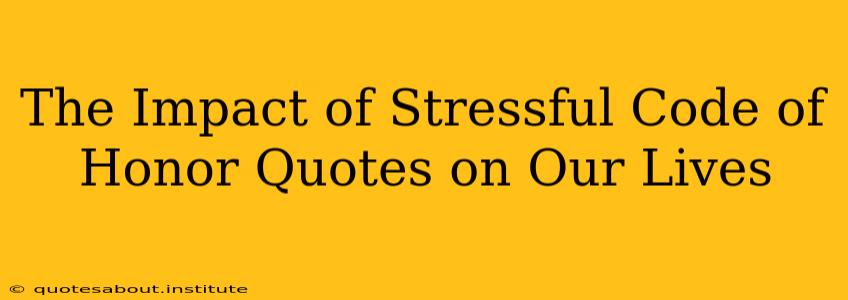The Impact of Stressful Code of Honor Quotes on Our Lives
The ubiquitous presence of "motivational" quotes, especially those emphasizing honor, duty, and relentless striving, has created a subtle but pervasive pressure on individuals. While ostensibly positive, many of these quotes, when interpreted rigidly or out of context, can contribute to significant stress and negatively impact mental well-being. This post explores the often-unseen consequences of these seemingly innocuous phrases and offers strategies for navigating their influence.
What are "Stressful" Code of Honor Quotes?
"Stressful" code of honor quotes aren't inherently negative. The issue arises from their potential to promote unrealistic expectations and a culture of self-criticism. Examples include:
-
"The only way to do great work is to love what you do." This quote, while inspirational, puts immense pressure on individuals to find passionate fulfillment in every aspect of their lives, ignoring the reality of mundane tasks and the perfectly acceptable experience of finding work merely satisfying rather than deeply passionate.
-
"Success is not final, failure is not fatal: it is the courage to continue that counts." While encouraging perseverance, this can minimize the importance of rest, self-care, and accepting setbacks as learning opportunities. Constant striving without respite can lead to burnout.
-
"Pain is inevitable, suffering is optional." This popular quote simplifies complex emotional experiences. While resilience is important, it’s crucial to acknowledge the validity of feeling pain and allowing oneself to grieve or process difficult emotions. Ignoring pain only prolongs suffering.
-
"Hard work beats talent when talent doesn't work hard." This quote promotes a meritocratic view that can be overly simplistic. While hard work is essential, talent and opportunity play significant roles in success, and ignoring these factors can lead to self-blame and discouragement.
How Do These Quotes Contribute to Stress?
These seemingly benign quotes contribute to stress in several ways:
-
Unrealistic Expectations: They often set impossibly high standards, leading to feelings of inadequacy and failure when those standards aren't met.
-
Self-Criticism: They can fuel a constant internal dialogue of self-judgment and comparison to others perceived as more successful.
-
Neglect of Self-Care: The emphasis on relentless striving can overshadow the importance of rest, relaxation, and mental health.
-
Perfectionism: The pursuit of unattainable ideals often leads to chronic stress and anxiety.
-
Ignoring External Factors: They can downplay the impact of systemic inequalities and external factors affecting success.
How Can I Reduce the Negative Impact of These Quotes?
Reframing your relationship with these quotes is crucial:
-
Recognize the Context: Most motivational quotes are intended as broad strokes of encouragement, not literal commandments.
-
Embrace Imperfection: Allow yourself to make mistakes, learn from them, and embrace the process rather than fixating solely on the outcome.
-
Prioritize Self-Care: Make time for activities that help you relax, recharge, and maintain your mental well-being. This is not a sign of weakness, but a necessity.
-
Focus on Progress, Not Perfection: Celebrate small victories and acknowledge your efforts, rather than solely focusing on achieving perfection.
-
Seek Support: Talk to friends, family, or a therapist if you are struggling with stress or feelings of inadequacy.
Are there alternative, less stressful quotes that promote a healthy mindset?
Absolutely! Focus on quotes that promote self-compassion, acceptance, and balance:
- "Be kind to yourself."
- "Progress, not perfection."
- "It's okay to not be okay."
- "Self-care is not selfish; it's essential."
- "Rest is productive."
By consciously selecting and engaging with positive and balanced messages, we can cultivate a healthier relationship with achievement and self-worth.
Conclusion: Finding Balance
The impact of seemingly innocuous code of honor quotes on our mental health should not be underestimated. By critically evaluating these messages, prioritizing self-compassion, and seeking balance, we can mitigate their potential to induce unnecessary stress and cultivate a more fulfilling and sustainable life. Remember, success is not a monolithic concept, and true fulfillment encompasses more than just relentless striving.

